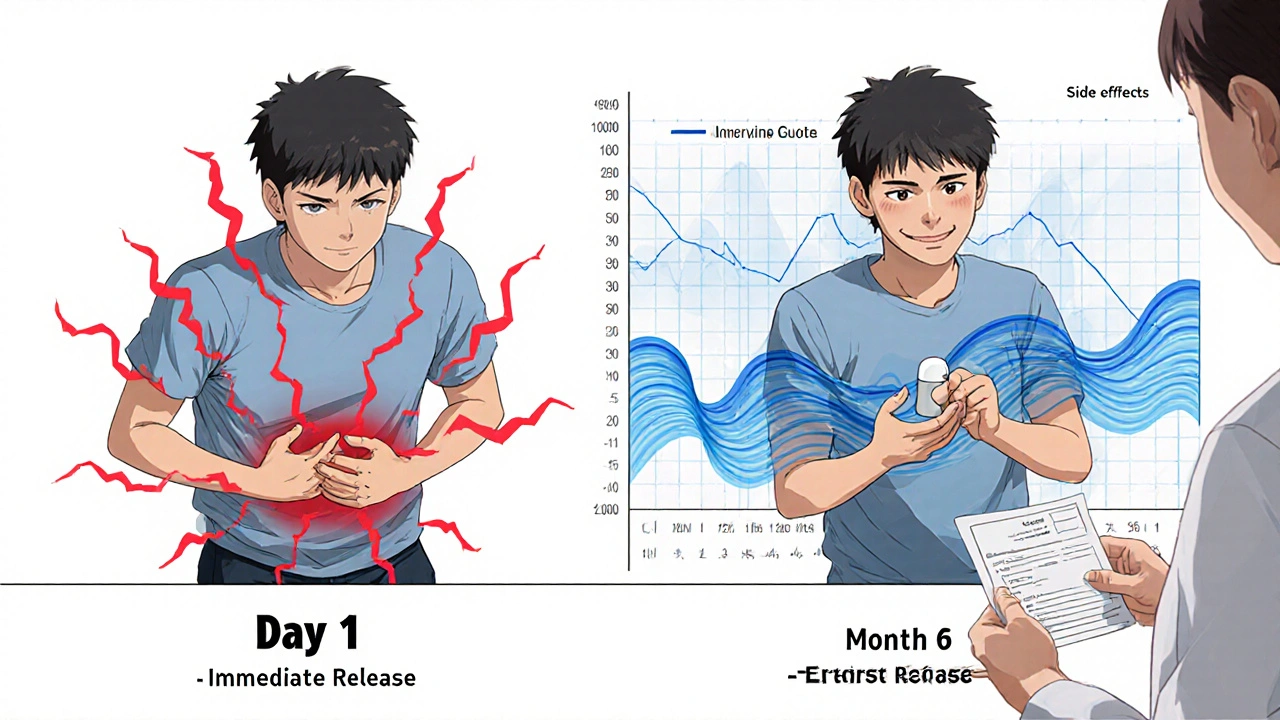Metformin is the most prescribed diabetes medication in the world. Over 160 million prescriptions are filled for it each year in the U.S. alone. Yet, despite its widespread use, confusion and fear still surround it. Many people stop taking it because they believe the side effects are unbearable, or they’ve heard it causes permanent damage. Others worry about vitamin B12 loss after years on the drug. But here’s the truth: most of what people think they know about metformin is wrong.
Myth: Metformin Is Too Hard on the Stomach
It’s true-when you first start metformin, your stomach might rebel. Diarrhea, nausea, bloating, cramps. These aren’t rare. In fact, about 28% of people experience them in the first few weeks. But here’s what most don’t tell you: those symptoms fade. In the Diabetes Prevention Program Outcomes Study, which followed patients for 15 years, GI side effects dropped to the same level as people taking a placebo after just the first year.
The problem isn’t metformin itself. It’s how it’s started. Taking 1,000 mg twice a day on day one is a recipe for discomfort. The right way? Start low. The Diabetes Prevention Program protocol recommends beginning with 500 mg once a day with dinner. Then, increase by 500 mg each week until you reach your target dose. That simple step cuts discontinuation rates from over 15% down to under 5%.
And if you still struggle? Switch to extended-release (XR). XR metformin releases the drug slowly, so your gut doesn’t get hit all at once. One study showed switching from immediate-release to XR cut diarrhea from 18% to just 8%. A Reddit user named Type2Warrior87 shared: "Started on 500mg IR, had terrible diarrhea for 2 weeks. Doctor switched me to 500mg XR once daily with dinner-zero issues after 6 months." That’s not luck. That’s science.
Myth: Long-Term Use Damages Your Liver or Kidneys
Metformin doesn’t hurt your kidneys. It’s cleared by them, so if your kidneys are already failing, you shouldn’t take it. But if your eGFR is above 30 mL/min/1.73m², metformin is safe. The FDA updated its labeling in 2016 to reflect this. Before that, doctors were too scared to prescribe it even to people with mild kidney changes. Now, we know better.
And your liver? Metformin doesn’t cause liver damage. In fact, it’s often used in people with fatty liver disease because it helps reduce liver fat. The real danger-lactic acidosis-is extremely rare. Only 3 to 10 cases per 100,000 patient-years. And almost all of those happen in people with severe kidney failure, heart failure, or who are dehydrated from illness. If you’re healthy and follow your doctor’s advice, this risk is lower than being struck by lightning.
The Diabetes Prevention Program tracked over 3,000 people for 15 years. No increased risk of organ damage. No rise in cancer. No hidden toxicity. Just steady, safe blood sugar control.
Myth: Metformin Makes You Gain Weight
Most diabetes drugs make you gain weight. Insulin? Weight gain. Sulfonylureas? Weight gain. Even some newer ones like GLP-1 agonists are expensive but still cause weight gain in some. Metformin? It does the opposite.
In the DPP study, people on metformin lost an average of 2-3% of their body weight over 10 to 15 years. That’s not dramatic, but it’s consistent. And unlike other medications, that weight loss doesn’t reverse after a year. It sticks. Why? Metformin reduces hunger slightly, lowers insulin levels, and makes your body more sensitive to the insulin you already have. That means less fat storage.
It’s not a weight-loss drug. But if you’re trying to manage type 2 diabetes and don’t want to gain pounds, metformin is one of the few options that actually helps you stay lean.

Fact: Metformin Can Lower Your Vitamin B12 Levels
This is real. And it’s often overlooked.
Long-term use-especially over four years-can reduce vitamin B12 absorption by up to 19%. The American Diabetes Association now recommends checking B12 levels every 2 to 3 years for anyone on metformin. Why? Low B12 causes nerve damage, fatigue, brain fog, and even anemia. These symptoms can be mistaken for aging or diabetes complications.
Studies show up to 30% of long-term metformin users develop deficiency. But here’s the good news: it’s easy to fix. A simple blood test. If your levels are low, a daily B12 supplement (500-1,000 mcg) or a monthly injection fixes it. No need to stop metformin. Just add B12.
One 2020 review in the Journal of Clinical Medicine found that people who took B12 supplements while on metformin had no drop in levels. The ADA says the benefits of metformin far outweigh this risk. But you have to be proactive. Don’t wait for numb toes or constant tiredness to get tested.
Myth: There Are Better Drugs Now
GLP-1 agonists like semaglutide (Wegovy, Ozempic) and SGLT2 inhibitors like empagliflozin (Jardiance) are popular. They help with weight loss, heart protection, and kidney benefits. But they’re expensive. A month’s supply can cost $800 or more. Metformin? Around $4 to $10 for a 30-day supply.
And here’s the kicker: no other drug has been studied as long or as widely. The DPP study lasted 15 years. The UKPDS study ran for 30 years. Metformin has decades of real-world data showing it reduces heart attacks, strokes, and diabetes-related deaths. The newer drugs are promising, but they’re still catching up.
The American Diabetes Association, the European Association for the Study of Diabetes, and the American College of Physicians all still recommend metformin as the first-line treatment. Why? Because it works. It’s safe. It’s cheap. And it’s been proven over time.

Myth: Everyone Tolerates Metformin
Not everyone. About 4% of people in clinical trials stop metformin because of side effects. That’s small, but it’s real. Some people have severe nausea even on XR. Others can’t handle any form.
But here’s what matters: if you can’t take metformin, it’s not because it’s broken. It’s because your body doesn’t respond to it. That’s okay. There are other options. But don’t assume you’re one of the 4% just because you had a rough start. Most people who quit early did so because they weren’t given the right advice.
Try this: start low. Go slow. Switch to XR. Take it with food. Wait three months. If you still can’t tolerate it, talk to your doctor about alternatives. But don’t give up after two weeks.
What to Do If You’re on Metformin
- Start at 500 mg once daily with your evening meal.
- Wait a week, then increase by 500 mg if you feel okay.
- Don’t rush to 1,000 mg twice a day. Go slow.
- If side effects persist, ask for the extended-release (XR) version.
- Get your vitamin B12 checked every 2-3 years.
- Don’t stop metformin without talking to your doctor-even if you feel fine.
- Keep taking it even if you lose weight or your A1C improves. It’s not just for blood sugar.
Metformin isn’t perfect. But it’s the most studied, safest, and most cost-effective drug we have for type 2 diabetes. The myths around it are louder than the science. Don’t let fear stop you from using a tool that’s helped millions live longer, healthier lives.
Does metformin cause weight gain?
No, metformin does not cause weight gain. In fact, it’s one of the few diabetes medications that can lead to modest weight loss-typically 2-3% of body weight over several years. This is due to reduced appetite and improved insulin sensitivity. Unlike insulin or sulfonylureas, which often cause weight gain, metformin helps maintain or even reduce body weight.
Can metformin damage your kidneys?
Metformin does not damage healthy kidneys. It’s cleared from the body through the kidneys, so if your kidney function is severely reduced (eGFR below 30 mL/min/1.73m²), it should be avoided. But for people with mild or moderate kidney changes, metformin is safe and often recommended. The outdated belief that it harms kidneys has been corrected by major guidelines since 2016.
How long does it take for metformin side effects to go away?
Most gastrointestinal side effects, like diarrhea and nausea, improve within a few weeks. In long-term studies, symptoms drop to the same level as placebo after about one year. Taking the extended-release version and starting with a low dose can speed up this process. If symptoms last longer than three months, talk to your doctor about switching formulations or adjusting your dose.
Is metformin safe for long-term use?
Yes, metformin is safe for long-term use. Studies tracking patients for up to 15 years show no increase in serious health risks like cancer, liver damage, or heart problems. The most common long-term concern is vitamin B12 deficiency, which is easily managed with supplements. The benefits of metformin-better blood sugar control, lower heart disease risk, and weight stability-outweigh the risks for most people.
Should I take B12 supplements with metformin?
If you’ve been on metformin for more than four years, yes. The American Diabetes Association recommends checking your B12 levels every 2-3 years. If levels are low, a daily supplement of 500-1,000 mcg is usually enough to restore them. You don’t need to stop metformin-just add B12. This prevents nerve damage, fatigue, and anemia without affecting the drug’s benefits.
Is metformin XR better than regular metformin?
For most people, yes. Extended-release (XR) metformin releases the drug slowly, which reduces stomach upset. Studies show switching from immediate-release to XR cuts diarrhea by more than half and reduces overall side effects by nearly 50%. XR is taken once daily, usually at bedtime, which also improves adherence. If you’re struggling with side effects, ask your doctor to switch you to XR.
Can I stop metformin if my blood sugar is normal?
Don’t stop without talking to your doctor. Even if your blood sugar is normal, metformin is still working to reduce your long-term risk of heart disease, stroke, and complications. Stopping it can cause blood sugar to rise again. If you’ve lost weight or improved your diet, your doctor may lower your dose-but stopping entirely is rarely recommended unless you’ve reversed diabetes through major lifestyle changes.
Next Steps
If you’re on metformin and feeling unsure, here’s what to do next:
- Check your last B12 level. If it’s been over two years, ask for a blood test.
- Review your dosing schedule. Are you taking immediate-release twice a day? Ask about switching to XR once daily.
- Track your GI symptoms. If you still have nausea or diarrhea after three months, don’t just tolerate it-talk to your doctor.
- Don’t compare yourself to others. Some people tolerate metformin perfectly. Others need time. Both are normal.
- Keep taking it. The longer you’re on it, the more you benefit-not just for blood sugar, but for your heart, liver, and overall longevity.
Metformin isn’t magic. But it’s one of the most reliable tools we have. Don’t let myths stop you from using it-or from staying on it long enough to see its real benefits.






Reviews
Let’s be real - metformin is just a Band-Aid for a broken food system. Big Pharma loves it because it’s cheap, patent-expired, and keeps people dependent while they eat processed garbage 24/7. The real solution? Stop treating symptoms and fix the damn root cause: industrial agriculture and sugar subsidies. But hey, why fix the system when you can sell a $4 pill?
Metformin is the pharmaceutical equivalent of a medieval leech - it doesn’t cure, it just mildly inconveniences the symptom while the real rot festers beneath. The B12 depletion? A feature, not a bug. The body’s screaming for truth - that insulin resistance isn’t a disease, it’s a rebellion against a carbohydrate-saturated dystopia. We’ve been conditioned to swallow pills instead of questioning why our ancestors didn’t need them.
XR version = life changer. 🚀 No more midnight bathroom marathons. Just take one at bedtime and forget about it. 10/10 would recommend.
I was terrified to start metformin after reading horror stories online, but I followed the slow-start advice and switched to XR - no issues after 3 months. Seriously, don’t give up too soon. Your gut just needs time to adjust. You got this 💪
I’ve been on metformin for 11 years now, and honestly, it’s been the quiet hero of my health journey. I didn’t lose 20 pounds or anything dramatic, but I stopped gaining weight even when I was stressed and eating poorly - which, let’s be honest, was most of the time. The B12 thing? Totally didn’t know about it until my doctor mentioned it during a routine checkup. Got my levels checked, started supplements, and my brain fog lifted. It’s not glamorous, but it’s real. And it’s kept me alive when I didn’t even know I was at risk.
They don’t want you to know this, but metformin is part of a global mind-control program disguised as diabetes care. The FDA changed the labeling in 2016 because they were forced to - after whistleblowers exposed that the drug was being used to suppress population growth in developing countries. B12 deficiency? That’s not an accident - it’s a targeted neurological dampener. You think you’re managing your blood sugar? You’re being managed.
metformin is a scam i swear to god i took it for 2 years and my b12 dropped to 140 and i had numb hands and my doc said its normal? no its not normal. they just dont care. i stopped it and took b12 injections and now im fine but theyll still tell you its safe. the system is broken. the pharma companies own the guidelines. the ada is just a marketing arm for big pharma. dont trust anyone. check your levels. always.
It’s fascinating how deeply embedded the mythos around metformin is - not just medically, but culturally. We’ve turned a simple, ancient molecule into a moral litmus test: if you’re on it, you’re either a responsible adult who follows science… or a weakling who won’t ‘just eat better.’ But the truth is, biology doesn’t care about willpower. Some people have insulin resistance because of genetics, epigenetics, stress, sleep, environment - not because they ate one too many donuts. Metformin isn’t a crutch; it’s a bridge. And the fact that we’re still arguing about whether it’s ‘worth it’ shows how little we understand about chronic disease as a systems problem - not a personal failure.
The data presented here is statistically sound, but the underlying assumption - that metformin should be first-line for all type 2 diabetics - is outdated. Lifestyle intervention, when properly implemented, is more effective than any drug. The DPP study showed this clearly. Why are we still prescribing a medication that merely mitigates symptoms when we have proven alternatives? The answer lies not in medicine, but in economics. A pill is easier to prescribe than a nutritionist, a gym membership, and behavioral therapy.
My dad’s been on metformin for 18 years. He’s 72, walks 5 miles a day, eats mostly plants, and his A1C is 5.4. He doesn’t even think about it anymore - just takes his XR with dinner and checks B12 every two years. I used to think he was just lucky. Now I realize he’s just been smart. No drama. No hype. Just consistency. That’s the real takeaway here - not the drug itself, but the discipline behind it.
In India, we’ve seen metformin work wonders in rural areas where access to specialists is rare. A simple tablet, costing less than a cup of tea, helps thousands manage diabetes without insulin. The B12 issue? Yes, it’s real - but it’s also fixable. We’ve started community health programs where they hand out B12 tablets along with metformin. No need for fear. Just education. Simple. Effective. Human.
Metformin is the only reason my cousin is still alive. He was diagnosed at 32 with A1C of 11.5. No money. No insurance. Just metformin and a bag of rice. He lost 40 pounds. He stopped feeling like he was walking through molasses. Now he works as a mechanic. Don’t let the elitists tell you this drug is useless. For millions of us, it’s not a luxury - it’s survival. And if you’re complaining about side effects, maybe you need to stop being so soft.
There is a metaphysical dimension to metformin that no clinical trial has captured. It is not merely a pharmaceutical agent - it is a mirror. It reflects our collective denial of metabolic truth. The nausea, the diarrhea, the B12 depletion - these are not side effects. They are the body’s rebellion against the false covenant we’ve made with modernity: that we can eat like gluttons and still be whole. Metformin does not heal. It merely postpones the reckoning. And yet - and yet - it gives us time. Time to ask the deeper questions. Time to sit with discomfort. Time to wonder: if a pill can hold back the tide, what does that say about the ocean?
So… you’re telling me I’ve been taking a $4 pill for 5 years and the only real risk is… needing a $5 B12 supplement? 😏 Guess I’ll keep taking it then. Thanks for the reassurance, science.
Let’s not pretend metformin is a panacea. It’s a tool. Like a hammer. Use it right - slow start, XR, B12 checks - and it works. Abuse it - start at 1000mg twice daily like a moron - and you’ll hate it. Same with any drug. The problem isn’t metformin. It’s the medical culture that treats dosing like a game of Russian roulette. You wouldn’t drive a Ferrari on dirt roads. Why treat your metabolism like that?